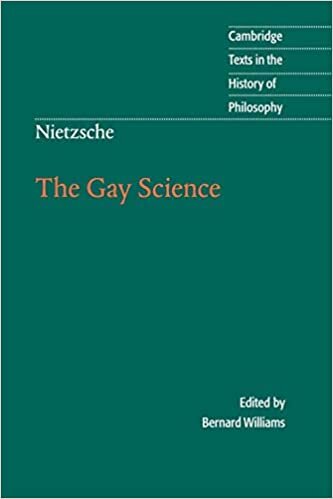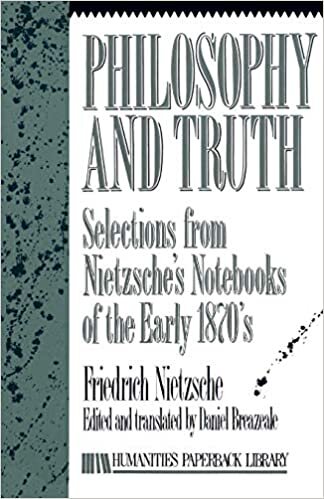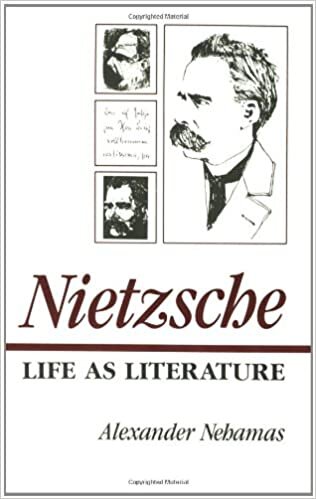Blogging Nietzsche—Nietzsche's Poetry: "Invitation"
Nietzsche’s writings, his short poems included, are deeply metaphorical. One of Nietzsche’s favorite metaphors is that of food. Besides its obvious connotation as nourishment for the mind and soul, Nietzsche’s use of food, such a blatantly biological concept, reinforces his attempt to bring us out out of our religious, Platonic, or Cartesian immaterialism and reembody us here in the physical and actual world.
In Nietzsche’s short poem “Invitation” (Nietzsche, The Gay Science, ‘Joke, Cunning, and Revenge’: Prelude in German Rhymes), Nietzsche styles himself as the giver of food in the manner of a dinner invitation—the master chef of food for thought and food for action:
1. Invitation
Dare to taste my fare, dear diner!
Come tomorrow it tastes finer
and day after even good!
If you still want more — I’ll make it,
from past inspiration take it,
turning food for thought into food.
The food Nietzsche refers to is his own writing. Dare to ingest what he has to say, if you are bold and brave enough! Read it again and again, letting the fine taste of his refreshing words soak into your very soul and freeing you from the common, watered-down, tasteless fare you have been accustomed to ingesting until now. Nietzsche offers a banquet of ideas for the mind and body instead of mere tasteless communion wafers for the soul.
Nietzsche’s ideas, and their import for your life, however, take time to percolate and digest, hence his statement that his food tastes even finer the day after (line 2). We are so accustomed to the notion that our philosophical ideas, and even our selves, should have immediate Cartesian certainty—thank you so much, René Descartes, for this wrong impression!—that we’ve forgotten that the most profound ideas take time to digest, and their import and application to our lives time to discover. Nietzsche’s reference to the time factor is both practical and a subtle jab to philosophy as a whole, interpreted as the quest for Cartesian certainty, particularly in terms of how we develop as people and individuals over time, and how we find threads of new meaning that grow and develop instead of being immediately and intuitively certain.
Alexander Nehamas, in his book Nietzsche: Life as Literature, calls Nietzsche “the most writerly of philosophers.” Nietzsche’s writerly qualities can be seen in line 4 of “Invitation” in his statement that if you still want more food, he’ll make it. That is, if you find his ideas palatable, he’ll keep writing and writing, and giving you more and more to digest, to inspire you to your own new meaning and greatness. Nietzsche was, in fact, one of the most prolific of philosophers, despite the mixed reception of his writings in his own time and his dabbling in various literary styles well beyond the bounds of mere philosophical analysis, a fact of Nietzsche’s writing that Nehamas likewise elaborates on at length.
The last line of “Invitation” is so thoroughly Nietzschean in style and content that it deserves special attention. Nietzsche does not want to provide you with mere food for thought, constrained to the working of the mind and imagination alone. Instead Nietzsche wants you to really digest what he has to say and turn it into food for your own life. Turning food for thought into food thus refers to turning ideas into actions that are unique for you as an individual, and perhaps for no one else. Food provides energy for your body, energy to sustain life and propel you forward in your projects, activities, and accomplishments. Nietzsche, therefore, want to spur you to action with his writings—for you to to take his ideas, for you to interpret and reinterpret them, and for you to let them motivate you not just to change your thinking but to propel you forward into action and into your own future that only you can envision for yourself, and only you can bring to fruition.
Turning food for thought into food, in the last line of “Invitation” is also a jab at traditional philosophy in general, and perhaps at moral philosophy in particular. It is all to easy to let philosophical ideas remain abstract, mere intellectual puzzles to be solved with the mind alone, instead of letting philosophical ideas affect not just your beliefs, but who you are as a person in the first place and the actions you take in your own life and in the world around you—the world you create by the choices you make, the projects you take up, and the things you create, whether personally or professionally.
One can be a moral philosopher, after all, and still be a reprehensible, pitiable excuse for a human being. In fact, Nietzsche might very well say that this is the norm in moral philosophy circles, with his penchant for intentional exaggeration and vast oversimplification. Likewise, one can be a so-called philosopher by focusing on the trivialities of your philosophical problem of choice without ever truly examining your own life and your most authentic aims and purposes for yourself. This, according to Nietzsche, is the real travesty in philosophy—to seek after wisdom so intellectually and abstractly that one never gets around to acting wisely, or to questioning one’s own life’s purpose, meaning, and character with the same intensity and scrutiny as one gives to the most inconsequential of philosophical puzzles and reflections.
Nietzsche, however, is wise enough to realize that he cannot digest your food for you, cannot do the interpretive work of his ideas in your own life for you. Only you can take up the mantle of real interpretation, real application, and real action. As Nietzsche says elsewhere in his unpublished work The Philosopher:
The philologists of the present age have proven themselves unworthy of being permitted to consider me and my book one of their own. It is hardly necessary to affirm that, in this case as well. I leave it up to them whether they want to learn anything or not. But I do not feel in the least inclined to meet them half way. (Nietzsche, The Philosopher, Philosophy and Truth: Selections from Nietzsche’s Notebooks of the Early 1870’s)
We are all familiar with the phrase, “You can lead a horse to water, but you can’t make him drink.” Nietzsche can provide you with a banquet of new ideas to consider, but he can’t make you read them or digest them to extract every last nutrient that would really nourish your weary soul—your soul that is used to eating pragmatically out of mere necessity instead of indulging in the finest dining on new ideas and actions for their own—and your own—sake. After all, you can visit a new city and still eat at McDonald’s the entire time, or you can sample the finest local cuisine available. Only you, however, can make the reservation, walk through the front door of the restaurant, sit down at the best table in the house—at the banquet table of life itself—and have your fill until you are truly nourished and not merely fed.
If you are merely reading Nietzsche without really digesting his words and being nourished in the form of new ideas that lead to new actions that are uniquely yours, you aren’t really reading Nietzsche correctly. And the same is true of philosophy as a whole. If you are a mere philosopher who is courageous in your own head, or even on paper, but aren’t equally courageous in your own life and your own choices, then you are an undernourished philosophical coward, eating but not digesting, reading and thinking and philosophizing impotently with no real consequence to your own life or the pathetic, lackluster world you create for yourself and around yourself by your own stultifying inaction. Sit down at Nietzsche’s banquet table and really start digesting instead!
Even better, perhaps one-up Nietzsche himself and start cooking up new ideas and new actions, new consequences, and new creations of your own to share with the world—as Nietzsche aimed to do in his own writings and as I am aiming to do in writing these words now. Like Nietzsche said of his own work, only you can decide whether or not you really want to learn something from his ideas and words—or from mine, for that matter—and put them into practice and into creative action in your own life. No one can do it for you. The existential burden, as always, is yours and yours alone.










